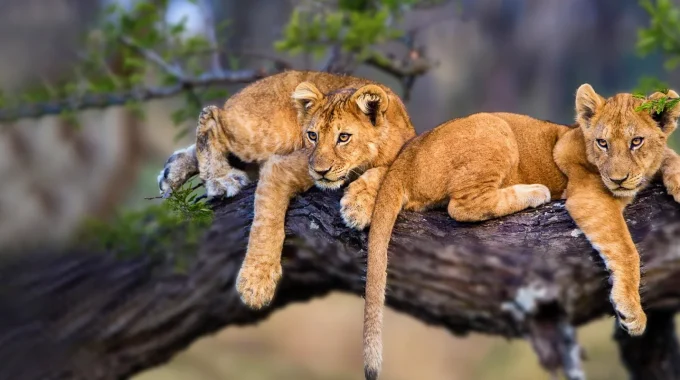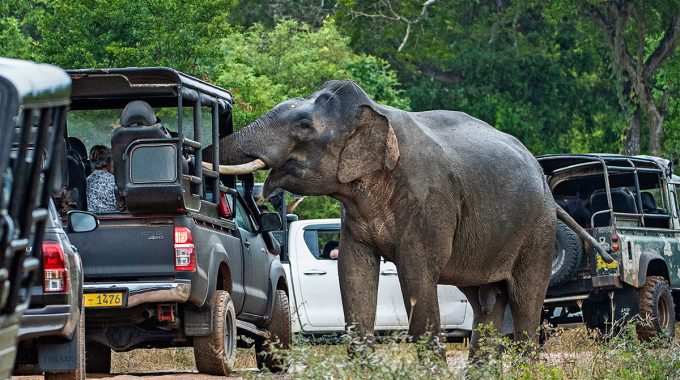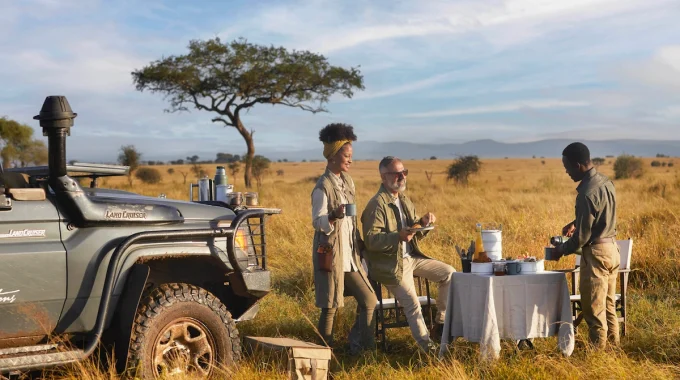Your Big African Safari Planner: What to Expect from the Top Safari Countries in 2025…
What is a Safari in Africa?

What is a Safari in Africa? – If you’ve seen photos of celebrities enjoying a safari in Africa, you might wonder: What exactly is a safari, and what is it like for the modern traveler? Let’s dive into the heart of Africa’s most iconic adventure experience.
A Safari is a Journey
The word “safari” comes from the Swahili language, spoken in East Africa. It originated from the Arabic word “safar,” meaning “journey” or “travel.” Traditionally, the term referred to an overland journey, particularly one involving exploration or hunting in Africa’s vast landscapes.
Over time, the concept of a safari evolved from being a hunting expedition to a conservation-focused adventure aimed at observing and photographing Africa’s wildlife in its natural habitats. Today, the word “safari” is closely associated with Africa, where it has become the pinnacle of wildlife tourism.
Is Safari Only in Africa?
While you might find safari-style experiences in other regions like Australia, India, or the United States, the authentic safari is uniquely African. The continent’s diverse landscapes, wildlife, and rich cultural history make it the only true home of the safari experience. Other wilderness tours, while offering similar opportunities to observe wildlife, simply cannot match the depth and authenticity of an African safari.
In Africa, a safari is much more than just a vacation. It’s an adventure, deeply rooted in the region’s culture, wildlife, and commitment to conservation. To truly understand the spirit of a safari, one must experience it in the heart of Africa’s national parks and game reserves.
What Does a Safari in Africa Involve?
In Africa, a safari typically refers to a wildlife safari, which involves traveling through natural areas like game reserves, national parks, and conservation areas to observe and photograph animals. This kind of safari brings travelers face-to-face with wildlife in their natural environments.
A safari is about exploration, adventure, and connection to nature. It’s not just about seeing animals; it’s about immersing yourself in the wild, breathing the fresh air, and experiencing the raw beauty of the African wilderness. Modern safaris have expanded beyond traditional game drives and now include walking safaris, boat safaris, and even hot air balloon safaris.
A Safari Is Not Just for Experts
A safari in Africa isn’t just for experienced travelers or outdoor enthusiasts. You don’t need to be an expert wildlife photographer or survivalist to enjoy a safari. Safaris are designed for everyone, from first-timers to seasoned travelers. Whether you’re enjoying a luxury safari lodge, a rustic camping experience, or an adventurous family safari, you can enjoy the beauty of the African wild in a way that suits your style.
Furthermore, safaris should not be confused with other types of wildlife experiences, such as visits to wildlife sanctuaries, animal rescue centers, or zoos. A true safari involves experiencing wildlife in their natural habitats, where they are free to roam and behave as they would in the wild.
The Origins of the Word “Safari”
The term “safari” can be traced back to the Arabic word “safar”, which means journey or travel. Early European explorers and hunters adopted this term during their expeditions into Africa, primarily for hunting large game like lions, elephants, and rhinos.
In the late 1800s, the term “safari” was introduced into the English language, where it became synonymous with African expeditions. It was British explorer Sir Richard Francis Burton who helped popularize the term, introducing it to the English-speaking world by 1860.
By the early 20th century, safari travel had evolved from hunting expeditions to wildlife observation. Today, safari refers not to hunting but to wildlife safaris that focus on conservation and photography of Africa’s stunning wildlife.
The History of African Safaris
African safaris began in the late 19th century when European explorers ventured into the wilderness to document and hunt Africa’s big game. These early safaris were large-scale expeditions, involving indigenous trackers, porters, and camp staff who helped organize and carry out the hunting trips.
The most famous of these early safaris was led by Teddy Roosevelt, the 26th President of the United States, who embarked on a safari in 1909 to collect animal specimens for the Smithsonian Institution. His expedition is considered one of the largest and most controversial of its kind, involving the slaughter of over 11,000 animals.
Today, hunting is no longer a part of most African safaris. Most safaris focus on wildlife viewing, photography, and supporting conservation efforts. Hunting safaris are now rare, and eco-friendly safaris that benefit the environment and wildlife are much more common.
The Role of Modern Safaris in Conservation
The modern African safari has become a vital tool for wildlife conservation. Tourism revenue generated by safaris helps fund national parks and game reserves, supporting efforts to protect Africa’s endangered species. Most safari operators collaborate with local communities and conservation organizations to ensure that their activities support long-term sustainability.
For instance, many safari lodges and operators contribute to anti-poaching initiatives and habitat restoration. These conservation efforts have been instrumental in preserving species like the African elephant, black rhino, and cheetah, which have faced significant threats from poaching and habitat loss.
Eco-Friendly Safaris in Africa
As environmental concerns grow globally, eco-friendly safaris have become more popular. Many African safari operators have embraced sustainable tourism practices, designing low-impact lodges and adopting eco-friendly policies that minimize the impact on the environment.
Eco-friendly safaris often feature accommodations that rely on solar power, rainwater harvesting, and waste recycling. In addition to reducing their carbon footprint, many safari companies support local conservation and social projects that help protect both wildlife and the surrounding communities.
For travelers who want to contribute to the environment during their trip, eco-safaris are an excellent option. By choosing an eco-conscious safari, visitors can enjoy Africa’s wildlife while ensuring that their travel supports sustainability efforts.
Socially Responsible Safaris in Africa
African safaris also have a positive social impact. Tourism dollars generated by safaris provide jobs, support small businesses, and fund important social programs in local communities. Safari operators often partner with local communities to create social upliftment initiatives, such as education programs, healthcare projects, and cultural exchanges.
In addition, safaris provide a platform for travelers to learn about the rich cultures and traditions of Africa’s indigenous peoples. Many safari companies include cultural experiences in their itineraries, such as visits to local villages or interactions with indigenous communities.
How Safaris Contribute to Africa’s Economy
In 2019, Africa’s tourism industry employed more than 24 million people, with wildlife tourism generating $29 billion annually. The safari industry plays a critical role in this sector, contributing over $12 billion in revenue to countries like Kenya, South Africa, Tanzania, and Botswana.
These funds not only support national economies but also help fund conservation programs that protect Africa’s wildlife. Additionally, the jobs and opportunities created by safaris help improve the standard of living for many people in rural African communities.
The Big Five Safari Experience
The Big Five of Africa refer to five iconic animals that safari-goers most want to see: lions, elephants, buffalos, leopards, and rhinos. Originally coined by big-game hunters, the Big Five are now the top attractions for wildlife photographers and enthusiasts on safari.
While these animals remain central to many safari experiences, it’s important to remember that the African wilderness is full of incredible wildlife beyond the Big Five. From giraffes and zebras to cheetahs and wild dogs, there are countless species waiting to be discovered.
Planning Your African Safari
Whether you’re dreaming of spotting the Big Five or immersing yourself in the African wilderness, a safari in Africa offers a once-in-a-lifetime experience. Plan your adventure by consulting with expert safari operators who can tailor the journey to your interests and preferences.
For more information, visit our Safari Planning Guide.
What Is an African Safari? A Comprehensive Guide to Africa’s Ultimate Wildlife Adventure
An African safari is more than just a vacation—it’s a transformative journey into the heart of the wild. Whether you’re seeking to witness the majestic “Big Five” in their natural habitat, immerse yourself in local cultures, or contribute to conservation efforts, a safari offers an unparalleled experience. This comprehensive guide delves into the origins, evolution, and modern-day significance of African safaris, providing you with all the information you need to embark on this extraordinary adventure.
What Is a Safari?
The term “safari” originates from the Swahili word safari, meaning “journey,” which itself is derived from the Arabic word safar, meaning “to travel.” Historically, safaris referred to overland expeditions into the African wilderness, often for hunting purposes. However, the modern concept has evolved to focus on wildlife observation, photography, and conservation.
The Big Five: Africa’s Iconic Wildlife
The “Big Five” refers to five of Africa’s most iconic and sought-after animals: lions, leopards, rhinoceroses, elephants, and buffaloes. Originally coined by big-game hunters due to the difficulty and danger involved in hunting these animals, the term has since been embraced by wildlife enthusiasts and photographers. Today, encountering these majestic creatures in their natural habitat is a highlight of many safari experiences.
Eco-Friendly and Sustainable Safaris
As global awareness of environmental issues grows, many safari operators are adopting eco-friendly practices to minimize their impact on the environment. Eco-friendly safari lodges, such as Mogotlho Safari Lodge in Botswana, are designed to blend seamlessly with the natural surroundings, utilizing sustainable materials and energy sources. These lodges often engage with local communities, promoting conservation efforts and providing economic benefits through sustainable tourism.
Socially Responsible Safaris
Modern safaris are increasingly focusing on social responsibility, ensuring that local communities benefit from tourism activities. Operators like Socially Responsible Safaris in Kenya emphasize positive economic impacts, environmentally sensitive accommodations, and meaningful relationships with host communities. By supporting local businesses, schools, and healthcare initiatives, these safaris contribute to the overall development and well-being of the regions they operate in.
Economic Impact of Safari Tourism in Africa
Safari tourism plays a crucial role in the economies of many African countries. In South Africa, for instance, wildlife tourists spent an average of R31,200 per person in 2023, nearly three times the average tourist expenditure. This high level of spending supports local economies, creates employment opportunities, and funds conservation initiatives, demonstrating the significant economic benefits of safari tourism.
Planning Your Safari Adventure
Planning a safari involves selecting the right destination, choosing between different types of safaris (such as game drives, walking safaris, or boat safaris), and determining the best time to visit. It’s essential to consider factors like the specific wildlife you wish to see, the level of comfort you desire, and your budget. Consulting with experienced safari operators can help tailor an itinerary that aligns with your interests and expectations.
Capturing the Safari Experience
Photography is a significant aspect of safari adventures, allowing travelers to capture the breathtaking landscapes and wildlife encounters. Many lodges and tour operators offer photography workshops and guided sessions to help guests enhance their skills and make the most of their safari experience.
Conclusion
An African safari is a unique opportunity to connect with nature, support conservation efforts, and experience the rich cultures of the continent. Whether you’re a first-time traveler or a seasoned adventurer, the memories and experiences gained from a safari are sure to last a lifetime. By choosing eco-friendly and socially responsible operators, you can ensure that your safari contributes positively to the environment and local communities.



